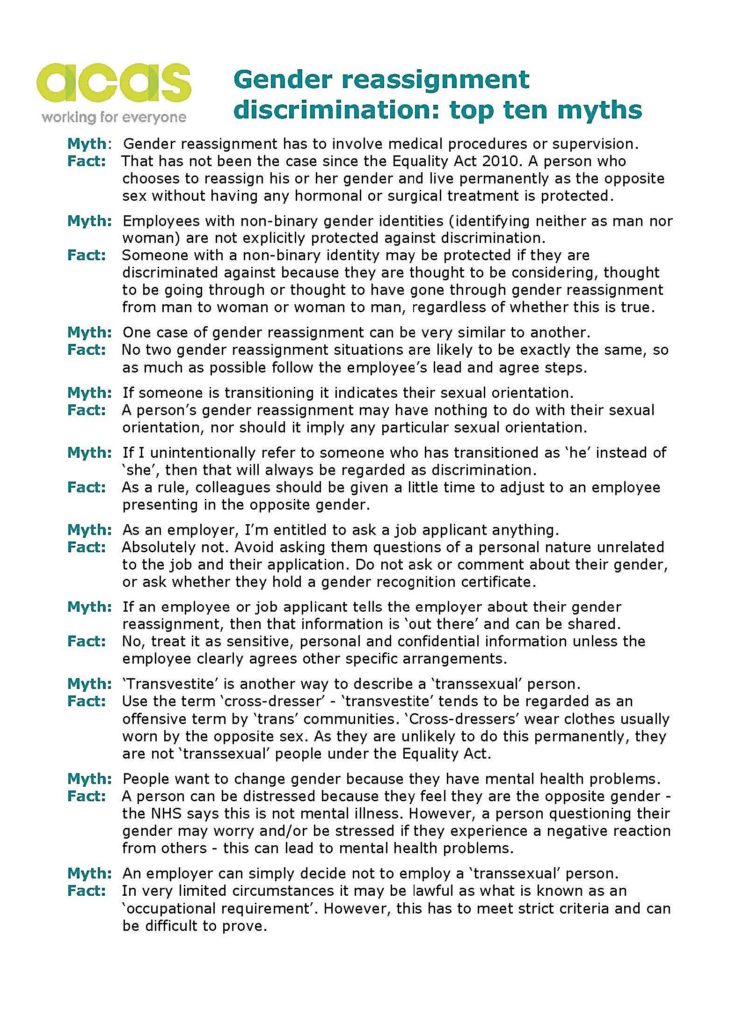LGBT Pride month
June is Pride month. Acas has published the guidance to help prevent discrimination in the workplace.
All PSS operatives are asked to familiarise themselves with the below guidance.
Sexual orientation discrimination
The Equality Act 2010 makes it unlawful to discriminate against employees, job seekers and trainees because of their sexual orientation. For example, an employer not promoting an employee purely because they are gay is likely to be discrimination.
The Act defines Sexual orientation as:
- orientation towards people of the same sex (lesbians and gay men)
- orientation towards people of the opposite sex (heterosexual)
- orientation towards people of the same sex and the opposite sex (bisexual).
The law applies equally whether someone is a lesbian, gay man, heterosexual or bisexual.
View or download the Acas guide: Sexual_Orientation_Discrimination_Nov(1)
The guidance covers four main types of discrimination.
Direct discrimination
Breaks down into three different sorts of direct discrimination of treating someone ‘less favourably’ because of:
- their actual sexual orientation (ordinary direct discrimination)
- their perceived sexual orientation (direct discrimination by perception)
- the sexual orientation of someone with whom they associate (direct discrimination by association).
Indirect discrimination
Can occur where there is a policy, practice, procedure or workplace rule which applies to all employees, but disadvantages people of a particular sexual orientation. An example of this could be a particular policy for maternity/paternity leave does not apply to same-sex couples.
In some limited circumstances, indirect discrimination may be justified if it is what the law terms ‘a proportionate means of achieving a legitimate aim’. Find out more in the Acas guide, Equality and discrimination: understand the basics [352kb].
Harassment
When unwanted conduct related to sexual orientation has the purpose or effect of violating an individual’s dignity or creating an intimidating, hostile, degrading, humiliating or offensive environment for that individual.
Victimisation
Is when an employee suffers what the law terms a ‘detriment’ – something that causes disadvantage, damage, harm or loss – because, for example, they have made or supported a complaint about sexual orientation discrimination.
Employers should ensure they have policies in place which are designed to prevent sexual orientation discrimination in:
- recruitment
- determining pay, and terms and conditions of employment
- training and development
- selection for promotion
- discipline and grievances
- countering bullying and harassment
- dismissal.
‘Coming out’ at work
When someone tells other people about their sexual orientation this is known as ‘coming out’. This process is personal and different for everyone. While many lesbian, gay and bisexual people are ‘out’ in their personal lives, they may not want to ‘come out’ at work.
If the employee is limiting who they tell, they also need to decide whether they want those people to keep the details of their sexual orientation confidential. If someone reveals a person’s sexual orientation to others against that person’s will, this may be seen as:
- harassment and/or
- a breach of the Data Protection Act (if details are stored as confidential data) and/or
- a breach of any of the employer’s relevant regulations or policies.
Harassment because of Sexual orientation
Harassment because of sexual orientation can take many different forms. It could be a verbal or written comment, what somebody thinks is a ‘joke’, exclusion from conversations or activities, violence or the threat of violence.
An employee’s complaint of this nature should be taken seriously and the employer should take care to listen to their concerns. It should also be mindful that this type of complaint can be difficult for the individual to discuss.
It is important for an employer to deal with this type of complaint, not only because of its legal obligations, but also because there could be knock-on effects. The employee being harassed might feel de-motivated and their productivity fall, or it might lead to them being absent from work through stress. A climate of harassment can also damage morale in the workplace.
An employer may benefit from having a specific policy setting out how it would deal with complaints about sexual orientation discrimination.
Sexual orientation and Religion or belief
The Equality Act has specific exemptions where employment is for the purpose of organised religion, such as being a Minister or otherwise promoting or representing the religion.
This means that some roles can be restricted to people of a particular sexual orientation. There can also be additional requirements related to sexual orientation, such as a requirement for gay men or lesbians to be celibate. Restrictions concerning religion can also apply to the protected characteristics of sex, gender reassignment, and marriage and civil partnership. To find out more, see ![]() Religion or belief discrimination: key points for the workplace [479kb].
Religion or belief discrimination: key points for the workplace [479kb].
Such a restriction only applies when:
- appointing a person who meets the requirement/s in question is a proportionate way of complying with the doctrines of the religion, or
- because of the nature or context of the employment, employing a person who does not meet the requirement/s would conflict with a significant number of the religion’s followers’ strongly-held religious convictions. The requirement/s must be a proportionate way of avoiding such a conflict.
The above is an example of what the law terms an ‘occupational requirement’. Find out more in the Acas guide, ![]() Equality and discrimination: understand the basics [352kb].
Equality and discrimination: understand the basics [352kb].
Making a claim of Sexual orientation discrimination
If an employee feels they have been discriminated against, they may be able to make a claim to an employment tribunal. However, it’s best to talk to the employer first to try to sort out the matter informally, in order to minimise the negative effects on all parties involved.
Further information is available from Ministry of Justice – Employment Tribunal guidance.
Through the Acas Helpline you can get free advice on specific problems and alternatives to a tribunal claim, such as Mediation or Early Conciliation, where appropriate.
You can also download:
The Acas guide ![]() Gender reassignment discrimination: key points for the workplace [455kb]
Gender reassignment discrimination: key points for the workplace [455kb]
You can also download:
Factsheet ![]() Gender reassignment discrimination employers tips [75kb]
Gender reassignment discrimination employers tips [75kb]
Acas commissioned research ![]() Supporting trans employees in the workplace [707kb]
Supporting trans employees in the workplace [707kb]
We have also produced a typology ![]() Gender identity typology [393kb] to help employers and employees understand the terminology in this area.
Gender identity typology [393kb] to help employers and employees understand the terminology in this area.



